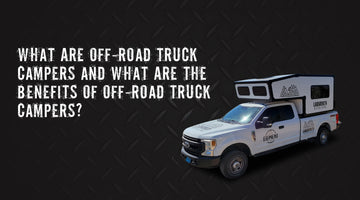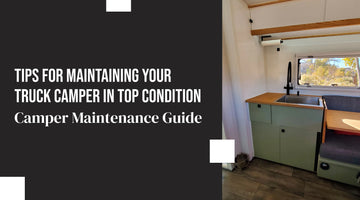The Ultimate Guide to Truck Campers: Everything You Need to Know
by Labyrinth Overland on Jul 25, 2024

If you're an adventurer at heart, there's nothing quite like the freedom and flexibility that truck campers offer. You may enjoy the great outdoors without sacrificing comfort thanks to these adaptable portable houses.
In this guide, we’ll delve into everything you need to know about truck campers, including what they are, how much they weigh, if they have bathrooms, and which are the best on the market.
What is a Truck Camper?
Truck campers are a type of RV that fits into the bed of a pickup truck. Unlike larger RVs, truck campers are compact yet fully equipped, making them a popular choice for off-road enthusiasts and weekend warriors. They offer the convenience of mobility combined with the comfort of home, allowing you to take your adventure anywhere your truck can go.
How Much Does a Truck Camper Weight?
The weight of a truck camper can vary significantly depending on the model and its features. Generally, they range from 1,000 to 4,000 pounds. It's crucial to ensure that your truck can handle the camper's weight, including any gear and supplies you plan to bring along. Overloading your vehicle can lead to mechanical issues and unsafe driving conditions.
Do Truck Campers Have Bathrooms?
One of the most common questions is, do truck campers have bathrooms? The answer is yes, many truck campers come equipped with bathrooms. These bathrooms typically include a toilet and a shower, although the size and features can vary. Some compact models may have a wet bath, where the toilet and shower share the same space, while larger models might offer more spacious, separate facilities.
What are the Features of Truck Campers?

When selecting a truck camper, consider the following features:
-
Size and Compatibility:
One of the primary considerations when choosing a truck camper is its size and compatibility with your truck. Truck campers come in various sizes, from compact models suitable for smaller trucks to larger units that require heavy-duty trucks with a higher payload capacity.
-
Bathroom Facilities:
Truck campers offer a range of bathroom options, catering to different comfort levels and camping preferences. Some campers feature full bathrooms with enclosed showers, toilets, and sinks, providing a similar experience to traditional RVs. These setups are ideal for campers who prioritize comfort and convenience during their travels.
-
Kitchen Amenities:
A functional kitchen is another crucial feature to consider in a truck camper. Most campers are equipped with a stove, typically propane-powered, allowing you to cook meals comfortably while on the road. Refrigerators, often powered by propane, electricity, or both, provide essential storage for perishable items.
-
Sleeping Arrangements:
Comfortable sleeping arrangements are vital for a restful camping experience. Truck campers offer various bed configurations, including queen-size beds, convertible dinettes, and bunk beds, catering to solo travelers, couples, or families.
-
Storage Space:
Ample storage capacity is essential for organizing gear, clothing, and supplies during camping trips. Truck campers typically feature cabinets, overhead compartments, under-bed storage, and exterior storage compartments for items like camping equipment, outdoor gear, and personal belongings.
-
Off-Road Capability:
For adventurers who enjoy exploring rugged terrain and off-the-beaten-path destinations, selecting a truck camper with off-road capabilities is essential. These campers are built with features such as heavy-duty suspension systems, robust construction materials, enhanced ground clearance, and off-road tires designed to withstand rough conditions and uneven terrain.
Setting Up Your Truck Camper:
Setting up a truck camper is relatively straightforward but requires some preparation:
-
Prepare Your Truck: Ensure your truck is in good condition and can handle the camper’s weight. Check the tires, suspension, and brakes.
-
Install Tie-Downs and Turnbuckles: Secure the camper to your truck using tie-downs and turnbuckles to prevent movement while driving.
-
Load the Camper: Carefully back your truck under the camper, ensuring it’s aligned correctly. Lower the camper into the truck bed and secure it with the tie-downs.
- Check Connections: Ensure all electrical and plumbing connections are secure and functioning.
What are the Benefits of Truck Campers?

-
Flexibility
One of the primary advantages of truck campers is their unparalleled flexibility. Unlike larger RVs, which may be limited by size and maneuverability, truck campers are compact and designed to fit into the bed of a pickup truck.
-
Comfort:
Despite their compact footprint, truck campers offer a surprisingly comfortable living space. They are equipped with essential amenities such as sleeping areas, kitchens, and bathrooms. The sleeping quarters often include cozy beds, sometimes in queen or full sizes, ensuring a restful night's sleep after a day of outdoor activities.
-
Cost-Effective:
Truck campers are generally more affordable than larger motorhomes or travel trailers. They typically have lower purchase prices and incur fewer operational costs, making them a budget-friendly option for travelers. Moreover, their compact size often translates to better fuel efficiency compared to larger RVs, reducing fuel expenses during travel.
-
Easy Storage:
When not in use, truck campers offer the convenience of easy storage. Unlike larger RVs that may require specialized storage facilities or large parking spaces, truck campers can be stored in a garage, driveway, or backyard.
-
Versatility:
Truck campers can be detached from your vehicle, allowing you to use your truck independently for other purposes when the camper is not needed. This flexibility is particularly advantageous for those who use their trucks for work or daily commuting, allowing them to switch between camper mode for recreational outings and regular truck use for everyday needs.
Maintenance Tips for Truck Campers:

-
Regular Inspections:
Conduct routine inspections of the camper's exterior, interior, and mechanical systems. Check for any signs of wear, damage, or malfunctioning components to address issues promptly and prevent costly repairs.
-
Clean and Seal:
Keep the camper clean both inside and out. Regularly inspect seals, seams, and joints for wear or leaks, especially around windows, doors, and roof vents. Apply appropriate sealants as needed to maintain waterproofing and structural integrity, protecting against water damage.
-
Battery Care:
Properly maintain the camper's battery by keeping it fully charged and clean. Check terminals for corrosion regularly and clean them if necessary. Ensuring the battery is in good condition ensures a reliable power supply for onboard systems and appliances.
-
Winterization:
If storing the camper during the winter months, follow recommended winterization procedures to protect plumbing, water lines, and other vulnerable systems from freezing temperatures. This includes draining water tanks, adding antifreeze where necessary, and insulating exposed pipes.
Overall, Labyrinth-Overland truck campers offer a convenient, versatile, and affordable way to experience the freedom and adventure of RV travel. If you're embarking on a weekend getaway or an extended road trip, a truck camper provides the perfect combination of comfort and mobility for your outdoor adventures. Choose the best truck campers for your adventure.
Ready to start your truck camper journey? Visit Labyrinth Overland to explore our top-of-the-line truck campers and gear. Adventure awaits—let us help you find the perfect camper for your next journey. Happy camping!
FAQs:
The advantage of a truck camper is its versatility. It allows you to have a compact and mobile living space while still being able to utilize your truck for transportation. Plus, you can easily explore remote or off-grid areas without worrying about finding accommodation.
Yes, many truck campers are equipped with bathrooms. These bathrooms can include toilets, showers, and sinks, providing convenience and comfort for travelers during their adventures.
A camper that is designed to be mounted onto a pickup truck is commonly referred to as a "truck camper." It's also sometimes called a "slide-in camper" or "pickup camper."
The weight of a truck camper can vary significantly depending on its size, materials, and features. On average, a truck camper can weigh anywhere from 1,000 to 5,000 pounds (450 to 2,300 kilograms), with some larger models exceeding this range. It's essential to consider the weight capacity of your truck's bed and any towing limitations when choosing a camper.



